Cx – The Salt Covenant 8: 8-18
The Salt Covenant
18: 8-18
The salt covenant DIG: How might material concerns damage the ability of the priests and Levites to adequately compensate them for this calling? Why do you think God allowed priests and Levites to eat the sacrifices offered to Him? What does this teach us about the worth of priests and Levites in God’s eyes?
REFLECT: Your Messianic rabbi and pastor work like salty priests, to preserve the spiritual health of your place of worship. How faithful are you in your giving to the Lord? Does He get the leftovers, or the best? The first, or the last? Does the Bible demand that you give ten percent as your tithe? Why? Why not?
I am your portion and inheritance among the people of Isra’el.
The most holy offerings, that were only eaten by the priests in the Tabernacle courtyard (18:8-10): ADONAI, for the second time (18:1), spoke to Aaron, saying: I Myself have put you in charge of the offerings given to Me. The priests were to receive parts of the sacrifices, firstfruits of the harvest and first-born animals. Most of those rights had already been mentioned in Leviticus 6:14 to 7:36, and 27:6-33.354 All the holy offerings the Israelites give Me, I give to you and your sons as your portion, your perpetual mitzvah (literally, a mitzvah for an age or dispensation). This shall be yours from the most holy gifts reserved from the fire, that portion that was NOT burned on the bronze altar. Something was regarded as holy, not because of some mysterious inner quality, but because it had been presented to ADONAI for His use. He then transferred the use of some of His holy things to the priests.355 There were three kinds of most holy offerings for the priesthood:
Every grain offering (see Leviticus, to see link click Aj – The Grain Offerings: Dedicated to God), was an unleavened mixture of fine flour, oil, and incense. A memorial portion was burned on the bronze altar as a sweet smelling aroma to ADONAI, and the remainder was eaten by the priests in the Tabernacle courtyard, every purification offering (see Leviticus Al – The Purification Offering: Purified by the Blood) was specified according to one’s ranking within the Levitical society. They ranged from a bull for the high priest, as that which was sacrificed by the high priest for himself and his family on Yom Kippur (Leviticus 16:3-14), to the two turtle doves or pigeons brought by the poor (Lev 5:7-10), or even a tenth of an ephah or two quarts of fine flour for a destitute individual (Lev 5:11-13), and every guilt offering (see Leviticus Am – The Guilt Offering: Evidence of Repentance) brought as a result of the violation of someone’s property or the inadvertent breaking of a covenant stipulation, usually consisted of a ram or its equivalent in silver shekels, plus a penalty of one-fifth of the value of the animal (5:14-19).356 Every male may eat it in an especially holy place, meaning the Tabernacle courtyard; it will be set apart for you (18:8-10). Only men could be priests, so naturally, only men could be inside the Tabernacle courtyard to eat the priestly portion. Because the priesthood was set apart as holy to YHVH, the food that they ate was likewise to be holy and set apart.
The holy gifts, which could be eaten by the priests and their families at their homes (18:11-13): Also, yours is the wave offerings that the people of Isra’el give (see the commentary on Leviticus Au – The Wave Offering and Priestly Portion). I have given these to you, your sons and your daughters with you. They could take these holy gifts home and share them with their families. This was a perpetual mitzvah. The food remained holy and was not to be violated by any unclean person. Everyone in your family who is ritually clean may eat it (see Leviticus Bk – Ritually Clean and Unclean Animals). Since the best items of produce were to be given to the LORD, they became the special food of the priests and their families. All the best of the olive oil, wine and grain, the firstfruits of what they give to ADONAI, I have given to you. The first ripe fruits of all that is in their land, which they bring to ADONAI, is to be yours.
The concept that God gets “the best of the first” is a constant theme in the Bible. The olive oil and wine mentioned here were not the dregs, but the finest of the first ripe fruits. In giving the first and best to Ha’Shem, believers were affirming with confidence that there would be something left over for their own needs. And if not, faithful believers still bless the Lord. As of today, believers don’t worship ADONAI just to fill their stomachs. But they (then, and we now) expect that the giving of the first and best to God will often result in enjoying more abundance than ever for themselves and for their family. Tithing in the Dispensation of Torah was about 25 percent (see Cy – Tithe on the Tithe), but that is not the standard for us today in the Dispensation of Grace (see the commentary on The Life of Christ Do – When You Give to the Needy, Do Not Do It to be Honored by Others: To guide us, the Bible teaches seven principles of scriptural giving).
In addition, on the basis of the provisions YHVH intended for the priests in the Torah, the writers of the B’rit Chadashah argued that those who minister the Word of God in the present Dispensation of Grace (see the commentary on Hebrews Bp – The Dispensation of Grace) should also be paid appropriately for their ministry (see the commentary on First Corinthians Bo – Laying Aside Rights).357
Redeeming the firstborn (18:14-18): The mitzvah of the redemption of the firstborn males has already been discussed in Ap – Redeeming the Firstborn and As – The Census and the Redemption of the Firstborn. Everything in Isra’el which has been devoted (Hebrew: cherem) unconditionally belonged to the priests (unless, of course, such things were destroyed, as in the story of Jericho). Everything that comes first out of the womb, of all living things which they offer to ADONAI, whether human or animal, will be yours (Exodus 13:2). Now we learn that the firstborn was a means of supporting the priests. However, the firstborn of a human being you must redeem because God does not allow human sacrifice, and the firstborn of an unclean beast you are to redeem because they could not be sacrificed either. The sum to be paid for redeeming anyone a month old or over is to be five shekels of silver [two ounces], as you value it, using the sanctuary shekel (this is the same as twenty gerahs) (18:14-16). The priests were to take the redemption price in exchange for the firstborn of the people.
Seemingly, the reason for paying a redemption price for the firstborn humans and unclean animals and the sacrifice of the firstborn of clean animals was to provide a perpetual reminder that conception, birth, and life are gifts of YHVH. Thus, Exodus 22:29-30 reads: You must give Me the firstborn of your sons. Do the same with your cattle and your sheep. As we think of these rituals throughout the biblical record, we realize that they extended to the life of the Savior. Since Yeshua was the firstborn of Mary, He had to be redeemed (see The Life of Christ Au – Jesus Presented in the Temple); then He became the Redeemer of all.358
But the firstborn of the clean animals, an ox, sheep or goat, were not to be redeemed; they are holy, devoted to ADONAI. They were to be sacrificed in the usual manner. You are to offer them up and splash their blood against the bronze altar and make their fat go up in smoke as an offering made by fire, as a fragrant aroma for ADONAI. Their meat will be yours, like the breast that is waved and the right thigh – they will be yours (18:17-18).
The salt covenant with the priesthood (18:19): All the contributions of holy furnishings which the people of Isra’el offer to ADONAI I have given to you, Aaron, your sons and your daughters with you; this is a perpetual mitzvah, an eternal covenant of salt before ADONAI for you and your descendants with you. In the ancient world, salt was chiefly employed as a perspective. In the days before chemical additives and refrigeration, salt came to represent a state of permanence. A covenant of salt was a covenant of perpetual obligation. In the comments on Leviticus 2:13, we learned that all the sacrifices placed on the bronze altar were salted as a symbol of the covenant of salt between God and Isra’el. In Second Chronicles 13:5, the Davidic right to the throne of Isra’el is spoken of as a covenant of salt. Do you not know that ADONAI has given the kingship of Isra’el to David and his descendants forever by a covenant of salt?
When explaining the symbolism of a salt covenant, the operative words are eternal and forever. Salt is a symbol of permanence. It is by this eternal covenant, that the throne of David belongs to the house of David. Similarly, it was by way of a salt covenant that the sacrifices of Isra’el belong to the house of Aaron. How ironic that these two institutions, both bestowed as eternal, remain in ruins today. The holy Temple has been in ruins for 2,000 years, and the sons of Aaron have no share in the terumah. The Davidic throne in Jerusalem has not been occupied by a son of David since the fall of Jerusalem in 586 BC (see The Life of Christ Mt – The Destruction of Jerusalem and the Temple Remembered on Tisha B’Av in 70 AD). Does this mean that the salt covenant has failed? Has God’s promise of an eternal inheritance come up short in both instances? No. The right to the gifts and sacrifices of the Israelites still belong exclusively to the sons of Aaron. If there were a Temple today, the descendants of Aaron would be entitled to those privileges. The right to the throne of Isra’el still belongs exclusively to the house of David. If there were a place for a sovereign monarch to rule over all Isra’el today, only a descendant of David would have the right to that throne.
But the prophet Hosea foresaw a long exile in which the children of Isra’el would be without a king, prince, or sacrifice. At the end of this exile, the children of Isra’el will repent, returning to ADONAI and the rightful Davidic King. For the Israelites will live many days without king or prince, without sacrifice or sacred stones, without ephod or household idols. Afterward the Israelites will return and seek ADONAI their God and David their king. They will come trembling to ADONAI and to His blessings in the last days (Hosea 3:4-5). As believers, we are confident that we have identified the man who will one day (and now occupies!) the throne of David. As the Son of David, He will satisfy the eternal salt covenant of the kingship made with the house of David (see the commentary on Revelation Fi – The Government of the Messianic Kingdom). We also read in the prophets that the Aaronic priesthood will one day be restored to their position of service and prestige during the Messianic Kingdom (see Jeremiah Gs – God Shows a Vision of the Messianic Temple).359
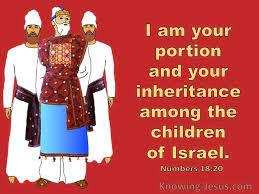
I am your portion (18:20): The priests were landless. They had no means of procuring an income aside from the priesthood. ADONAI said to Aaron, “You are not to have any inheritance or portion in their land; I am your portion and inheritance among the people of Isra’el.” The prophet Ezeki’el says the same thing: Their inheritance is to be this: I Myself am their inheritance. You are not to grant them any possession in Isra’el – I Myself am their possession (Ezeki’el 44:28). Therefore, YHVH assures the sons of Aaron that, although they are landless and without inheritance in Isra’el, He is their portion; He is their inheritance. This is a rich heritage indeed!
For the priesthood, the concept of having God alone as one’s portion resonates with our own position in the world today. It is the reality of our daily lives. Aside from the provision secured for Messianic rabbis and pastors ministering for the Lord, we have no portion. It is the same for those disciples who heed the Master’s call to forsake all and follow after Him: Yes! I tell you that there is no one who has left house, brothers, sisters, mother, father, children or fields, for My sake and for the sake of the Good News, who will not receive a hundred times over, now, in the present age, homes, brothers, sisters, mothers, children and lands — with persecutions! — and in the age to come, eternal life (Mark 10:29-30).360
Dear Heavenly Father, Praise You that You are our portion forever! How very wonderful that when I chose to follow You as my Lord and Savior, that You came to live within me! Yeshua answered and said to him: If anyone loves Me, he will keep My word. My Father will love him, and We will come to him and make Our dwelling with him (John 14:23). You are always near! For God Himself has said, “I will never leave you or forsake you,” (Hebrews 13; 5b). Peace reigns within my heart for You are always with me.
How wonderful You are my portion. I don’t have to seek after riches or fame (which both disappear), but only to rest in the joy of pleasing You! You are a wonderful Father! You are always completely Holy, Loving, Wonderful, Omniscient, Omnipresent, Omnipotent . . . What a joy to have such as Awesome Heavenly Father who is always watching over me, and waiting patiently for me to come to Him in prayer. Habakkuk came to You with a troubling question, ‘Why would You use a more evil nation, Babylon, to punish Israel?’ Habakkuk wisely realized that he could trust in the God of Salvation (Hab 3:13). But the righteous will live by faith. Though the fig tree does not blossom, and there is no yield on the vines, though the olive crop fails, and the fields produce no food, the flock is cut off from the fold, and there are no cattle in the stalls. Yet will I triumph in ADONAIi, I will rejoice in the God of my salvation! ADONAI my Lord, is my strength. He has made my feet like a deers, and will make me walk on my high places (Hab 2:4c, 3:17-19).
We can see clearer now to trust in the God of Salvation. Habakkuk lived several hundred years before Messiah appeared. We have seen come true the fulfillment of Messianic prophecies, such as Isaiah 53 and Micah 5:2. God’s children can see God’s great love in Messiah Yeshua’s willingness to bear the sins of the world, that all who chose to love and follow him would receive Messiah’s righteousness (Second Corinthians 5:21), be saved and go to live forever in heaven. How fantastic that You are the portion for Your children and that nothing can separate them from Your love! But in all these things we are more than conquerors through Him who loved us. For I am convinced that neither death nor life, nor angels nor principalities, nor things present nor things to come, nor powers, nor height nor depth, nor any other created thing will be able to separate us from the love of God that is in Messiah Yeshua our Lord. In Messiah Yeshua’s holy Name and power of His resurrection. Amen



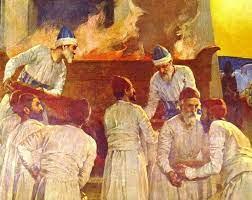
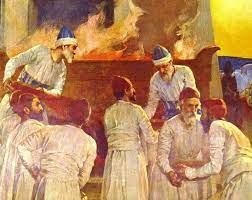
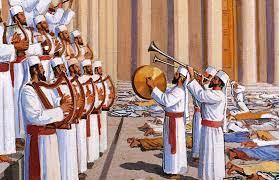
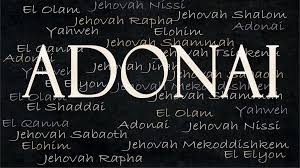
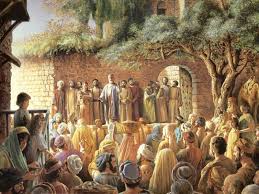
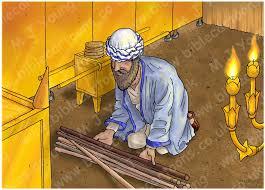
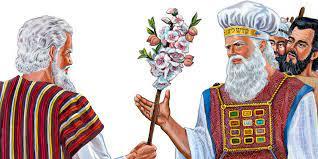
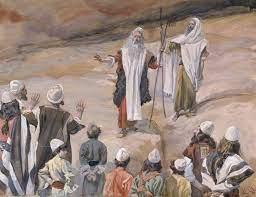
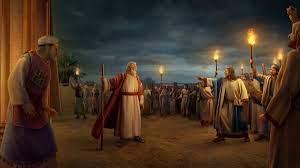
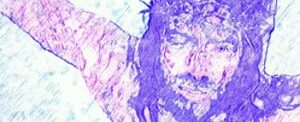
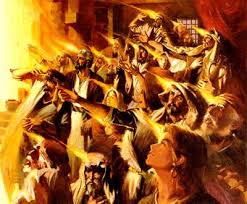
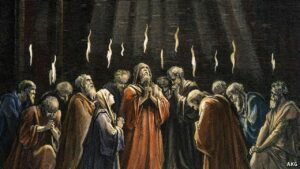
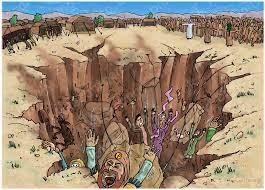
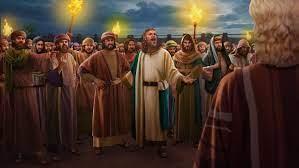
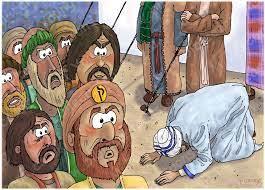
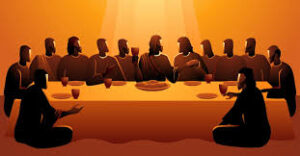
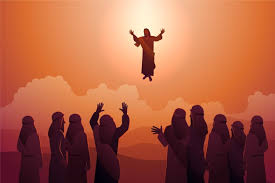
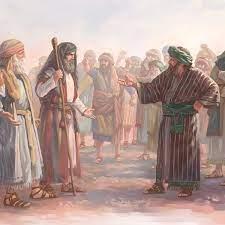
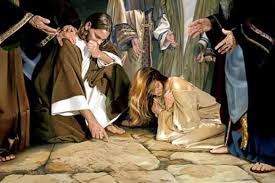 टोरा-शिक्षकों और फरीसियों ने उसे उस समूह के सामने खड़ा किया जिसे गुरु पढ़ा रहा था, और दंभ के साथ यीशु से कहा, “रब्बी, यह महिला व्यभिचार के कार्य में पकड़ी गई थी” (युहन्ना ८:३बी-४ सीजेबी)। वहां हर कोई जानता था कि इसका क्या मतलब है। तब नेता ने प्रसन्नतापूर्वक जाल फैलाया जब उसने यीशु से कुशलता से पूछा, उसके होठों से जहर टपक रहा था, “आप क्या कहते हैं?” किसी को भी, न तो वह समूह जिसे मसीहा पढ़ा रहे थे, न ही कोषेर राजा के विरोधियों, न ही उस महिला को उस उत्तर की उम्मीद थी जो उसने दिया था।
टोरा-शिक्षकों और फरीसियों ने उसे उस समूह के सामने खड़ा किया जिसे गुरु पढ़ा रहा था, और दंभ के साथ यीशु से कहा, “रब्बी, यह महिला व्यभिचार के कार्य में पकड़ी गई थी” (युहन्ना ८:३बी-४ सीजेबी)। वहां हर कोई जानता था कि इसका क्या मतलब है। तब नेता ने प्रसन्नतापूर्वक जाल फैलाया जब उसने यीशु से कुशलता से पूछा, उसके होठों से जहर टपक रहा था, “आप क्या कहते हैं?” किसी को भी, न तो वह समूह जिसे मसीहा पढ़ा रहे थे, न ही कोषेर राजा के विरोधियों, न ही उस महिला को उस उत्तर की उम्मीद थी जो उसने दिया था।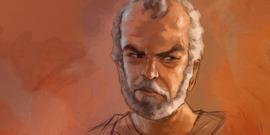
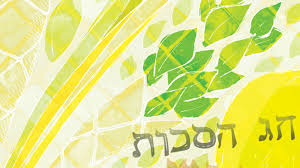 इस उत्सव की खुशी का एक और गहरा कारण योम किप्पुर की क्षमा पर आधारित था। प्रायश्चित का महान दिन (मेरी टिप्पणी देखें निर्गमन जिओ – प्रायश्चित का दिन) सुक्कोट (लैव्यव्यवस्था २३:२७ और ३४) से पांच दिन पहले हुआ था। योम किप्पुर पर इज़राइलियों को एडोनाई के सामने अपने व्यक्तिगत अपराध और पश्चाताप को स्वीकार करना था और टोरा की ६१३ आज्ञाओं को बनाए रखने के लिए खुद को फिर से समर्पित करना था। इसके अलावा, इस दिन दैवीय योजना के अनुसार विशेष बलिदानों द्वारा पूरे राष्ट्र के अपराध का निपटारा किया गया। त्योहार के आखिरी और सबसे महान दिन को महान दिन या होसन्ना रब्बा (युहन्ना ७:३७ए) कहा जाता था। इसलिए, सुक्कोट का सातवाँ दिन सप्ताह का चरमोत्कर्ष था और शबात के रूप में मनाया जाता था, संभवतः वादा किए गए देश में प्रवेश की याद में। (देखें
इस उत्सव की खुशी का एक और गहरा कारण योम किप्पुर की क्षमा पर आधारित था। प्रायश्चित का महान दिन (मेरी टिप्पणी देखें निर्गमन जिओ – प्रायश्चित का दिन) सुक्कोट (लैव्यव्यवस्था २३:२७ और ३४) से पांच दिन पहले हुआ था। योम किप्पुर पर इज़राइलियों को एडोनाई के सामने अपने व्यक्तिगत अपराध और पश्चाताप को स्वीकार करना था और टोरा की ६१३ आज्ञाओं को बनाए रखने के लिए खुद को फिर से समर्पित करना था। इसके अलावा, इस दिन दैवीय योजना के अनुसार विशेष बलिदानों द्वारा पूरे राष्ट्र के अपराध का निपटारा किया गया। त्योहार के आखिरी और सबसे महान दिन को महान दिन या होसन्ना रब्बा (युहन्ना ७:३७ए) कहा जाता था। इसलिए, सुक्कोट का सातवाँ दिन सप्ताह का चरमोत्कर्ष था और शबात के रूप में मनाया जाता था, संभवतः वादा किए गए देश में प्रवेश की याद में। (देखें 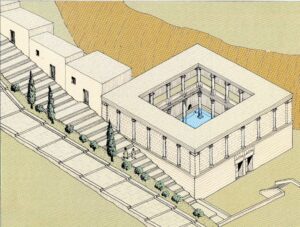
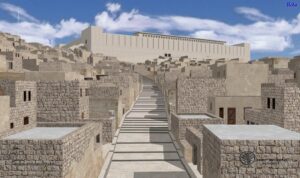 सिलोम के तालाब से वापस मन्दिर तक:
सिलोम के तालाब से वापस मन्दिर तक: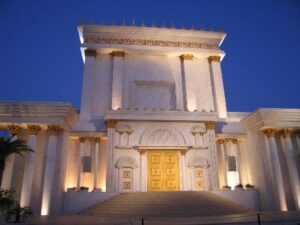 पहले चरण में वे भजन १२० गाएंगे, दूसरे चरण में वे भजन १२१ गाएंगे, तीसरे चरण में वे भजन १२२ गाएंगे, चौथे चरण में वे भजन १२३ गाएंगे, चरण एक से पंद्रह तक सभी रास्ते और भजन १२० से भजन १३४ तक। खड़े होने की जगह सीमित थी क्योंकि लाखों यहूदी जो शहर और शेखिना के शिविर के भीतर के क्षेत्र में थे, उनमें सभी को जगह नहीं मिल सकती थी। इज़राइल के दरबार में अनगिनत पुरुष भरे हुए थे (देखें एम्डब्लु – दूसरे मंदिर का आरेख) और कई महिलाओं ने उनके दरबार के ऊपर स्थित दीर्घाओं से पानी डालने का जश्न मनाया। ये शानदार दीर्घाएँ दावत के दिनों में बड़ी सभाओं में विशेष रूप से महिलाओं के लिए आरक्षित थीं। इसमें महिलाओं को महिलाओं के दरबार और शखिना के शिविर दोनों में पूजा गतिविधियों का उत्कृष्ट दृश्य दिखाई दिया। लेकिन महिलाओं के दरबार के भीतर भी पुरुषों और महिलाओं की एक बड़ी भीड़ थी। .
पहले चरण में वे भजन १२० गाएंगे, दूसरे चरण में वे भजन १२१ गाएंगे, तीसरे चरण में वे भजन १२२ गाएंगे, चौथे चरण में वे भजन १२३ गाएंगे, चरण एक से पंद्रह तक सभी रास्ते और भजन १२० से भजन १३४ तक। खड़े होने की जगह सीमित थी क्योंकि लाखों यहूदी जो शहर और शेखिना के शिविर के भीतर के क्षेत्र में थे, उनमें सभी को जगह नहीं मिल सकती थी। इज़राइल के दरबार में अनगिनत पुरुष भरे हुए थे (देखें एम्डब्लु – दूसरे मंदिर का आरेख) और कई महिलाओं ने उनके दरबार के ऊपर स्थित दीर्घाओं से पानी डालने का जश्न मनाया। ये शानदार दीर्घाएँ दावत के दिनों में बड़ी सभाओं में विशेष रूप से महिलाओं के लिए आरक्षित थीं। इसमें महिलाओं को महिलाओं के दरबार और शखिना के शिविर दोनों में पूजा गतिविधियों का उत्कृष्ट दृश्य दिखाई दिया। लेकिन महिलाओं के दरबार के भीतर भी पुरुषों और महिलाओं की एक बड़ी भीड़ थी। .
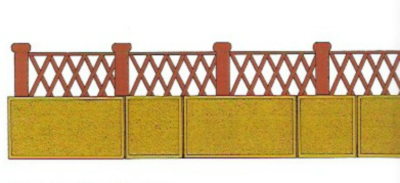 Pablo escribe sobre varias divisiones que Yeshua elimina para hacernos uno consigo mismo: derribó la pared intermedia de separación, es decir, la enemistad; aboliendo en su carne la ley de los mandamientos dados en reglamentos (Efesios 2:14b-15a). Fuera del Templo Sagrado durante el período del Segundo Templo, había una división conocida como soreg. Era un muro bajo que rodeaba el Templo Sagrado, que servía como límite.
Pablo escribe sobre varias divisiones que Yeshua elimina para hacernos uno consigo mismo: derribó la pared intermedia de separación, es decir, la enemistad; aboliendo en su carne la ley de los mandamientos dados en reglamentos (Efesios 2:14b-15a). Fuera del Templo Sagrado durante el período del Segundo Templo, había una división conocida como soreg. Era un muro bajo que rodeaba el Templo Sagrado, que servía como límite.